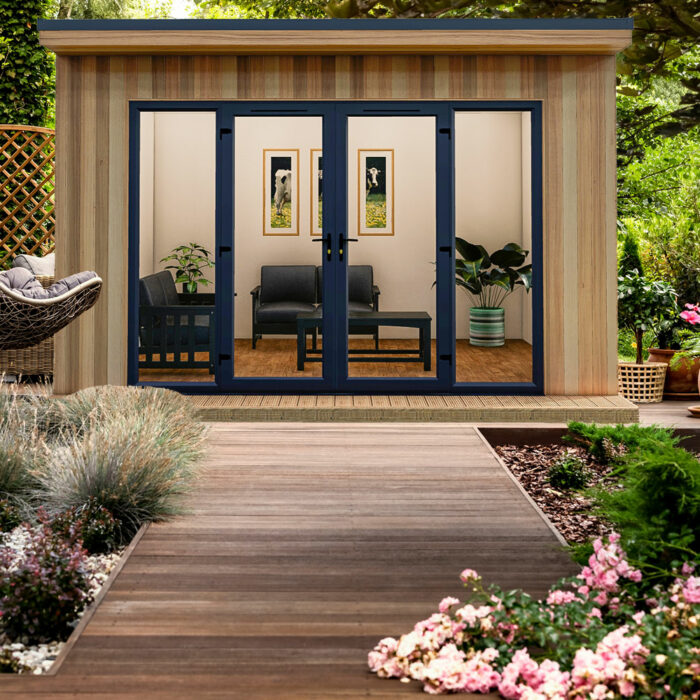Great News On Planning Permission On Garden Rooms
Great News On Planning Permission On Garden Rooms
Blog Article
What Planning Permission Do You Need For Gardens, Etc. In Terms Of Highways Concerns?
Highways issues, whether or not they relate to the building of conservatories, gardens offices or outhouses, as well as garden rooms and extensions are likely to have an important influence on the requirement for permission to plan. Here are some of the most important aspects to consider. Visibility and sight lines:
If the new structure obstructs the view of drivers that are entering or exiting the property, or impedes the view lines at junctions or bends in the road, a planning permit is required. The planning authority will evaluate whether the building is the risk of compromising road safety.
The highway is close by:
Structures built close to the highway, for example front garden rooms or extensions near the street, typically require approval for planning. Distance regulations are in place to ensure that the construction isn't a hindrance to the safe operation and usage of the highway.
Access and Egress
Planning permission may be required when you plan to alter or construct new access points. This is done to ensure that access and exit points are secure for traffic and don't disrupt traffic flow.
Parking Arrangements:
Planning permission could be required if a proposed structure affects existing parking spaces or demands additional parking. The authorities for planning will look into whether the proposed development will provide enough parking for the area and also if there are parking problems in the street.
Traffic Generation
Planning permits are necessary for any project expected to generate traffic like garden offices, for instance, where clients are visiting. This includes a review of local traffic levels and road conditions.
Impact on Pedestrian Access
If the proposed structure encroaches upon pedestrian walkways or pavements the building must be approved for planning. The safety of pedestrians as well as ensuring they have the ability to access the site is paramount.
Impact of Construction on Highways
A planning permit may be required to mitigate the impacts of highway construction, such as the heavy traffic of vehicles and temporary obstructions. The authority responsible for planning can impose conditions to minimize disruption to the road network during construction.
Water drainage and runoff:
Another aspect to consider is the development's effect on drainage or water runoff. The proposed structure has to be approved by the planning authority in order to prevent flooding and drainage problems in the roadway.
Street Furniture and Utilities
The construction is required to be approved if the construction could impact street furniture (e.g. lamp posts and signs) or underground utilities (e.g. electrical cables and water pipes). Planning authorities will work with the agencies to address these problems.
Conformity to Highway Authority Guidelines:
The local highway authority may have specific guidelines for development close to highways. Planning permits ensure that the regulations are adhered to to ensure road safety.
Noise and disturbances from traffic
If the new structure will increase noise or disturb traffic (e.g. garden offices that host visitors or deliveries) the planning permission will need to be sought to evaluate these impacts and to mitigate them.
Public Transport Accessibility
Planning permission is required when the project could be detrimental to public transport infrastructure, like trains and bus stops. The impact on public transport users and the integration with the transport network will be taken into consideration.
In summary, highways concerns are an important factor in the planning permission process for garden rooms, conservatories outhouses, garden offices or extensions. In order to avoid any negative impacts on pedestrian access, traffic or the safety of roads and infrastructure, it's essential that the proposed development does not impact these aspects. Early consultation with local authorities such as the highway authority as well as the planning authority will help resolve these issues and ensure compliance with relevant regulations. Take a look at the top composite garden buildings reviews for site info including costco outbuildings, ground screws vs concrete base, garden rooms in St Albans, luxury outhouse, garden room heater, garden rooms hertfordshire, garden room vs extension, 4m x 4m garden room, do you need planning permission for a garden room, my outhouse and more.
What Kind Of Planning Permission Is Needed For Gardens, Rooms, Etc. In Terms Of The Impact On The Environment?
Planning permission can be subject to the environmental impacts of garden rooms, conservatories and outhouses. These are important considerations for the environment Biodiversity:
If the proposed structure impacts local wildlife habitats like hedgerows, trees or ponds then planning permission is required. It may be necessary to conduct an ecological study to reduce and evaluate the impact.
Habitats and species that are protected
Planning permission is required when the area is home to endangered species (e.g. bats, newts, etc.)), or is located within or near areas of special scientific significance (e.g. Sites of Special Scientific Interest: SSSI). It is important to take special measures to protect these species.
Preservation Orders for Trees Preservation Orders
Planning permission might be required if the structure involves the removal or alteration of trees protected by TPOs. Local authorities may request for replacement plants or alternative mitigation measures.
Risk of flooding and Water Management: Risk and Water Management:
Permission to develop in areas with high risk of flooding or near bodies of water is necessary. An assessment of flood risk (FRA) could be required to ensure the structure is capable of draining and doesn't increase flood risks.
Sustainable Construction Practices
To ensure that sustainable construction materials and methods are used, planning permission may be required. It is important to consider energy efficiency, insulation and carbon footprint.
Drainage and Surface Water Runoff:
Environmental considerations involve the impact of a building's construction on surface water runoff and drainage. Planning permission will ensure that drainage systems to avoid waterlogging and flooding have been put in place.
Land and soil stability:
Planning permits are required in cases where the proposed building could alter the stability of land or soil. This can include issues such as subsidence or soil erosion, especially on sloped sites.
Air Quality
Planning permission is required for developments that may impact local air quality like those located near industrial areas or major highways. The pollution levels in the air must be within acceptable levels and mitigation measures should be implemented.
Noise Pollution:
Planning permission might be required if a proposed garden room usage is likely to create significant noise. The local authority will assess noise levels and potential impacts on neighbours and the environment.
Waste Management:
Effective waste management throughout and post-construction is vital. Planning permission assures there are recycling plans and waste disposal that minimize environmental impact.
Energy Efficiency
Planning permission may involve conditions for energy efficiency, such as the use of solar panels, high-performance glazing or other green technologies. This reduces environmental footprint.
Conformity with Environmental Regulations:
Developments must comply with local and national environmental regulations, such as the UK Environmental Protection Act. Planning permission assures that the development meets the environmental and legal conditions.
Summary: The planning permission granted for conservatories, gardens, or outhouses, as well as garden extensions and offices should be determined by a wide range of environmental effects. It is important to consult with local authorities at the beginning of the planning process, so that you can understand the specific specifications. It will also help ensure the development is environmentally friendly and complies with all relevant regulations. Read the top how much does a garden room extension cost for site tips including do i need planning permission for a garden room with toilet, composite garden rooms, insulated garden rooms, costco outbuildings, luxury outhouse, garden room, garden room planning permission, costco outbuildings, small garden office, garden rooms in St Albans and more.
What Planning Permissions Are Required For Garden Rooms, Etc. On Agricultural Lands?
Consider the following restrictions and planning permissions when building a garden space, conservatory, garden office, outhouse or an extension to agricultural property. These are the most important aspects Change of Use
The land that is used for agriculture can be used for agricultural activities as well as other related ones. Changing the use of the land for gardening or residential use typically requires approval for planning. It's because this requires a shift in the designated agricultural purpose.
Permitted Development Rights:
Land for residential and agricultural use have distinct permitted development. Certain types of agricultural structures are able to be built with no planning approval, however it is typically only for farms and not for residential garden rooms or office.
Scale and size:
The scale and size of the structure proposed can affect whether a planning permit is needed. The larger buildings or those that have a large footprint on land are more likely to need planning permission.
Impact on agricultural use:
Planning permission is likely to be required if the new construction hinders the agricultural uses of the land. This could mean that the land is reduced in the space available for livestock and crop production.
Green Belt Land:
When land that is used for agriculture is designated Green Belt, additional restrictions are put in place to prevent urban sprawl. Green Belt land is subject to strict criteria and permits for building new structures.
Design and Appearance
The structure's style and appearance must reflect the rural character in the area. The permission for planning will guarantee that the building won't negatively impact the natural landscape or visual enjoyment.
Environmental Impact:
Environmental impact is a consideration for any construction on land that is agricultural. If you're applying for planning permission, an environmental impact study may be needed to make sure that the new structure does not harm the ecosystems of the area.
Closeness to existing buildings:
The planning requirements could be impacted due to the close proximity of a proposed garden office or space to an existing agricultural building. Structures close to farm buildings are viewed differently than structures that are located in open areas.
Access and Infrastructure
Planning permission will determine if the existing infrastructure is able to support the new building. The planning permission will determine whether the existing infrastructure is able to support a new building.
Class order is used to:
Planning law defines the specific applications of land for agriculture. Changing the use class to accommodate non-agricultural structures often requires planning permission to make sure that the new use is in line with the local policies on planning.
Local Planning Policies
Local planning authorities have specific policies pertaining for agricultural land. These policies determine whether planning permission is granted for non-agricultural structures and will take into consideration things like local development plans and the needs of the community.
National Planning Policy Framework
In the UK, the National Planning Policy Framework provides guidelines on how land should be used and developed. Permission to build structures on land used for agriculture will be assessed in light of the NPPF which focuses on sustainable development and protection of rural areas.
In the end the planning approval for garden rooms, conservatories, outhouses, garden offices, or extensions on agricultural land is generally required due to the need to alter the land's usage and ensure that it is in compliance with national and local planning policies. It is crucial to discuss with your local authority to know the requirements specific to your area. Read the best garden office near me for more recommendations including what size garden room without planning permission, do i need planning permission for a garden room with toilet, garden outhouses, garden rooms in St Albans, garden room vs extension, ground screws vs concrete base, outhouse builders, garden room permitted development, garden room heater, composite garden rooms and more.